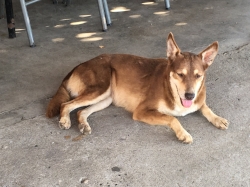A Dog's Life - Costa Rica Style
/Dog chillin' in the shade at a local restaurant.
The F2P clan was in Costa Rica for ten days this past February. We did a lot of walking and exploring and became fascinated with one particular aspect of the place.
It wasn't the hot weather (34C/93F is the usual high for the day), the beautiful volcanic sand beaches that sparkle like diamonds, the unique flora or the fauna both on land and in the Pacific ocean, the unique feel of the bustling tourist beach town of Playa del Coco or the helpfulness of the international staff at our boutique hotel.
No. It was man’s best friend.
Dog soaking in the sunshine on the sidewalk on Playa del Coco's main drag.
Our local dive shop's greeter and resident mascot. She enjoys visitors, especially those who take a minute to give her a good ear scratch.
We became absolutely fascinated with the local dogs. They roam the beaches, the main streets, the yards, and our hotel’s main and second floor. They look healthy and happy. And calm, even serene.
Most of them are medium-sized dogs. There are terriers, hounds, even a pitbull. Some are purebred, some are mixed breed.
A couple of local dogs offering their good morning greetings at breakfast.
Puppy cooling herself in her "dugout" at the local carwash. She did come out for a little affection from Mr. F2P later on in the AM.
These aren’t feral dogs. They’re cared for by their owners and the larger community. Some have collars, others don’t, but what they have in common is a sense of belonging. They’re in tune with the environment. They understand the behaviour of the people, vehicles and the general ebb and flow of the town that surrounds them. They walk or trot, they don't run unless playing with their master or other dogs, usually beachside away from traffic and businesses. And you must have guessed it already: local dogs are never tethered to their owner by means of a leash or other restraint.
There’s no fear, no need to protect any turf or master. They share the town, just as the people do. They share the attention, the food, the parks and beaches, the shady spots to cool off in from mid-morning to mid-afternoon. They’re also not demanding of the local or the tourist population. You want to give them something, that’s cool, but you’re not likely to see one aggressively beg for anything. The most you will get is a dog sitting at some distance from you quietly watching what you’re up to.
At first, I was nervous about these dogs. I have a fear of dogs and have known them to bite. Fortunately, within a day their demeanour won me over. No matter the size or the breed, I became nearly devoid of fear. Fear was replaced with curiosity.
“When we are balanced people, it is easier for us to give and receive affection. ”
They live a life of abundance—a dog’s life—where the ability to live in the moment is a given because they’re in need of nothing. They’re in need of nothing because they believe that whatever they need will come, eventually.
“If you live in a modern, First or Second World country, it can be very easy to lose touch with nature.”
“Talking loudly, dashing around the place, getting upset at little things—all of these will tell your dog that this is how this pack behaves.”
They’re nothing like the Western dogs we’re used to. Unlike these happy pups, Western dogs tend to be one or more of the following: possessive, entitled, impatient, anxious, fearful, overly excited, preoccupied, aggressive, loud, conditionally obedient, and usually never fully integrated into the family.
Mr. F2P and I have come to believe that dog behaviour is a reflection of our respective societies and societal values.
Costa Ricans live how we used to live: focused on the family and the larger community—including the dogs in this beach town, as opposed to work, status and stuff. At least, this is the case in Playa del Coco. But it may very well be similar in other parts of the country, given that many of these values are reflected in the country’s labour laws and local mores:
- Family and the welfare of children come first*
- Health care is available for all
- Community is valued, people are engaged with one another
- There is always time to be civil (ok, except when behind the wheel apparently)
That's as pushy as they get. Two feet from the table and not a peep. We even had one sleep outside our hotel room door for a while. I guess she took a liking to us.
It seems the almighty dollar and pressure from first world countries hasn't trumped these, at least for now.
Co-existing with these four-legged community members was a privilege and one of the delightful unexpected surprises we usually encounter when we vacation.
They taught us a lot in a very short time and we hope to have a similar experience again in the future. For now, we turn to our own household to figure out how to bring a little CR vibe to our own "pack".
*Example: I was at one of the local banks to exchange USD for local currency (Colones) and there were a dozen people in line in front of me. A young woman walks in with a baby in her arms. The security guard immediately escorted her to a chair next to the lineup. When the next teller became available, the young mother skipped the line. Wow!









